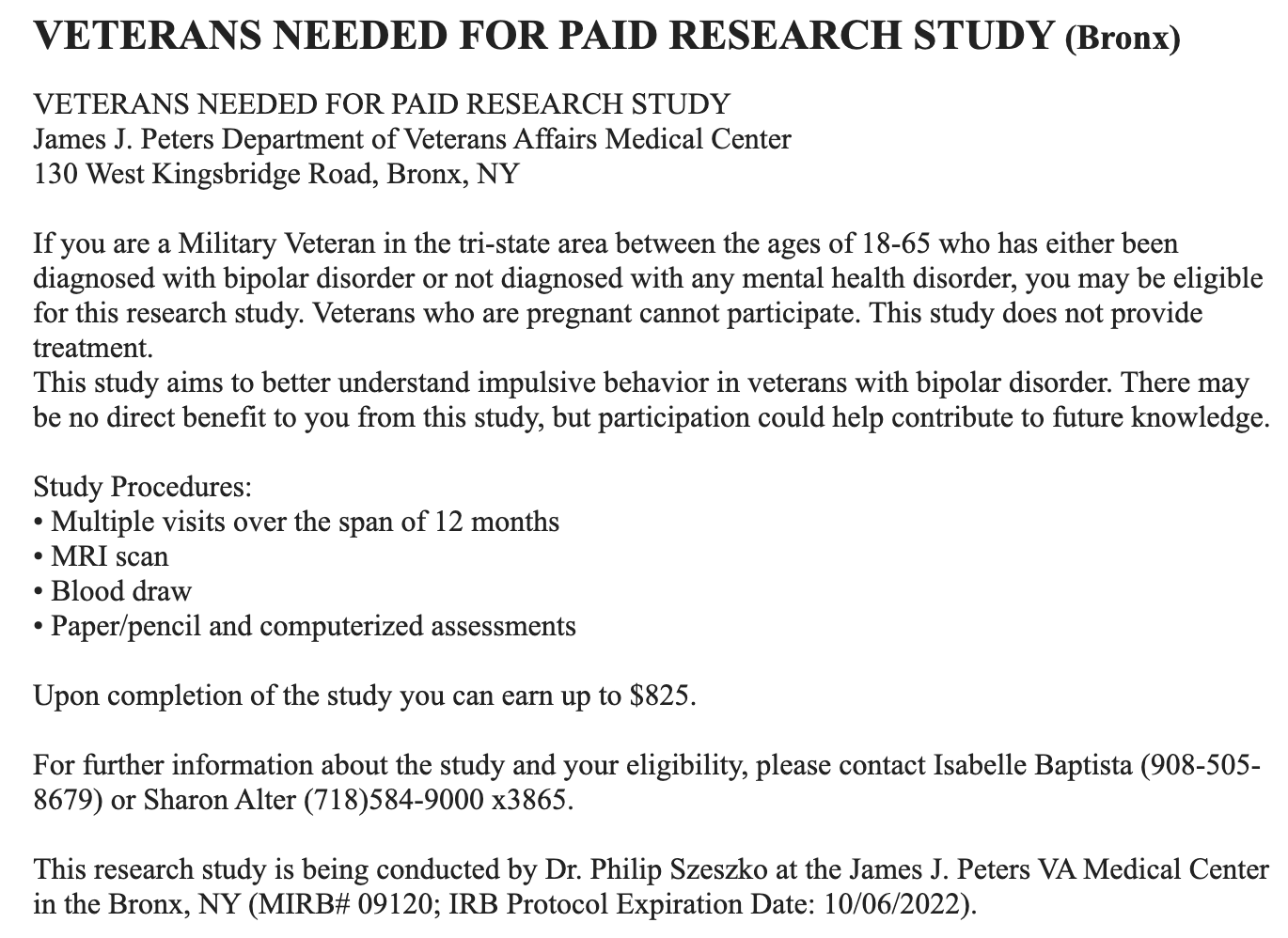About Our Research
Dr. Szeszko is Professor of Psychiatry and Neuroscience at the Icahn School of Medicine at Mount Sinai and a licensed clinical psychologist at the James J. Peters VA Medical Center.
His main research interests focus on the use of magnetic resonance imaging to identify aberrant neurobiological mechanisms in patients with severe psychiatric disorders and their translational relevance. A particular emphasis of Dr. Szeszko’s research is mapping properties of white matter fibers as well as strategies for resolving the crossing of white matter fibers using advanced imaging techniques.
Dr. Szeszko has received grant funding from the National Institute of Mental Health, DANA Foundation, Brain and Behavior Research Foundation, Obsessive-Compulsive Foundation, and American Foundation for Suicide Prevention. He is the current PI of a VA Merit Award entitled “Predicting Suicidal Behavior in Veterans with Bipolar Disorder using Behavioral and Neuroimaging Based Impulsivity Phenotypes and MPI” as well as an R01 grant award entitled “Longitudinal neuroimaging and neurocognitive assessment of risk and protective factors across the schizophrenia spectrum.”
Dr. Szeszko has authored over 140 peer-reviewed manuscripts and sits on the Editorial Board of Progress in Neuro-psychopharmacology and Biological Psychiatry.

Philip Szeszko, Ph.D.
philip.szeszko@mssm.edu
Professor of Psychiatry in the Department of Psychiatry at the Icahn School of Medicine at Mount Sinai.
Licensed clinical psychologist at the James J. Peters VA Medical Center within the Mental Health Patient Care Center and Mental Illness Research, Education, and Clinical Center (MIRECC).
Grants and Awards
MPI: Erin A. Hazlett, Ph.D. and Philip Szeszko, Ph.D.
Longitudinal Neuroimaging And Neurocognitive Assessment Of Risk And Protective Factors Across The Schizophrenia Spectrum (R01 MH121411)
Schizotypal personality disorder (SPD) is similar to schizophrenia (SZ), but with fewer and attenuated abnormalities, representing an important yet understudied intermediate SZ-spectrum phenotype that provides important information regarding etiology, genetics, treatment and risk factors associated with psychosis. This study utilizes a Research Domain Criteria (RDoC) approach coupled with longitudinal multimodal MR imaging and neurocognitive assessment in SZ-spectrum disorders to identify aberrant neural circuitry and cognition along a continuum from healthy controls to SPD (in the SZ spectrum but not fully psychotic) to SZ (psychosis). Changes in frontal-temporal regions/circuitry and neurocognitive measures over time will be examined together using novel approaches (e.g., machine learning) to predict diagnostic group, symptom severity, and functional outcome for the identification of key factors associated with risk and resilience in the SZ spectrum.
Principal Investigator: Philip Szeszko, Ph.D.
Predicting Suicidal Behavior in Veterans With Bipolar Disorder Using Behavioral and Neuroimaging Based Impulsivity Phenotypes (I01 CX002039)
Studies examining the relationship between psychiatric illness and suicide from the Department of Veterans Affairs indicate that individuals with bipolar disorder have the highest rate of suicide, which is even greater compared to post-traumatic stress disorder, schizophrenia and major depression. When left untreated, bipolar disorder has a 5-15% risk of death by suicide making it a top priority in Veterans’ mental health care. Individuals with bipolar disorder behave impulsively – even during euthymic periods and understanding the relationship between impulsivity and suicidal behavior in bipolar disorder may assist in the identification of individuals at greatest risk for a future suicide attempt. We propose assessing both trait and state measures of impulsivity using self-report measures and functional magnetic resonance imaging to predict the occurrence of suicidal behavior longitudinally over 1 year in Veterans with bipolar disorder.
Co-Investigator: Philip Szeszko, Ph.D.
Cognitive and Neural Mechanisms of the Accelerated Aging Phenotype in PTSD (R01 MH111596)
Post-traumatic stress disorder (PTSD) appears to promote aging-associated syndromes such as frailty, and older patients with PTSD exhibit faster cognitive decline and have twice the risk of dementia compared to individuals without PTSD. These observations suggest that the adverse health and functional outcomes associated with chronic PTSD in older patients may be explained by a deleterious interaction between pathophysiologic changes underlying PTSD and the biology of aging, the end result of which is to accelerate senescence throughout the body and particularly in the brain. This study investigates the influence of chronic PTSD on signatures of aging at neural, cognitive, somatic, and behavioral levels of analysis. We will test the hypothesis that chronic PTSD, over and above other contributing factors, accelerates biological aging in the brain and body, leading to adverse behavioral consequences such as frailty and cognitive decline. By elucidating the interaction of chronic PTSD with aging processes, data from this project may contribute to the development of rationally designed, personalized, and age-appropriate novel treatments.
Previous Grants and Awards
May 1, 2015 – April 30, 2018 | R21MH107855
Principle Investigator: Philip Szeszko, Ph.D.
Crossing White Matter Fibers as an Endophenotype in First-Episode Psychosis
July 1, 2013 – June 30, 2015 | R21MH101746
MPI: Philip Szeszko, Ph.D.
Detecting Which Patients With Schizophrenia Will Improve with Omega-3 Treatment
May 8, 2007 – April 30, 2011 | R01MH076995
MPI: Philip Szeszko, Ph.D.
Diffusion Tensor Imaging in First-Episode Schizophrenia
Publications
Click the links below to see a list of Dr. Szeszko’s publications in PubMed and PlumX.
Laboratory Members

Philip Szeszko, Ph.D., Director
Dr. Szeszko is Professor of Psychiatry in the Department of Psychiatry at the Icahn School of Medicine at Mount Sinai and a licensed clinical psychologist at the James J. Peters VA Medical Center within the Mental Health Patient Care Center and Mental Illness Research, Education and Clinical Center (MIRECC). Dr. Szeszko has received funding from the Brain and Behavior Research Foundation, Obsessive-Compulsive Foundation, American Foundation for Suicide Prevention, DANA Foundation, and National Institute of Mental Health.

King-Wai Chu, Ph.D., Image Analyst
Education
BS in Aerospace Engineering, Polytechnic University
MS in Aeronautics and Astronautics, Polytechnic University
MS in Applied Math & Statistics, Stony Brook University
PhD in Applied Math & Statistics, Stony Brook University
Biography
Dr. Chu is an expert in image processing of structural MRI, functional MRI, DTI and FDG-PET data. He has expertise in a variety of software packages used for neuroimaging data analysis including SPM, FSL, AFNI, Brain Voyager, E-Prime and DTI-Studio. He performs quality assurance upon image acquisition followed by image processing and analysis. He ensures that reliable data is acquired, optimizing signal-to-noise ratio for the key regions of interest in various research studies.

Kim Goldstein Zinn, PhD, Clinical Neuropsychologist
Education
BA, Princeton University
PhD in Clinical Psychology, Temple University
Biography
Dr. Zinn is a clinical neuropsychologist who specializes in the assessment and treatment of children, adolescents, and adults with a wide range of psychiatric and neurologic conditions. Dr. Zinn has published several peer-reviewed papers on emotion and cognition with Dr. Hazlett’s lab. Prior to joining Mount Sinai, Dr. Zinn was an Assistant Professor of Neuropsychology, Dept. of Psychiatry at Weill Cornell Medical College, and an Assistant Attending Psychologist at New York-Presbyterian Hospital.

Chi Chan, Ph.D., Clinical Psychologist
Education
BA in Psychology, Temple University
PhD in Clinical Psychology, University of Central Florida
Biography
Dr. Chan is a licensed clinical psychologist and Assistant Professor in the Department of Psychiatry at the Icahn School of medicine at Mount Sinai. She completed her Advanced Psychology Fellowship at the Mental Illness Research, Education, and Clinical Center (MIRECC VISN2) at the James J. Peters VA Medical Center. She has published work on neuroimaging and neurocognition in schizophrenia-spectrum disorders.

Sharon Alter, MA, Clinical Research Coordinator
Education
BA in Psychology, Syracuse University
MA in Clinical Psychology, Teacher’s College, Columbia University
Biography
Sharon has worked as a clinical research coordinator for Dr. Szeszko since April 2020. She primarily works on Dr. Szeszko’s VA Merit “Predicting Suicidal Behavior in Veterans with Bipolar Disorder Using Behavioral and Neuroimaging Based Impulsivity Phenotypes.”

Sean Hollander, BA, Clinical Research Coordinator
Education
BA in Biological Sciences, Cornell University
Biography
Sean has worked as a clinical research coordinator for Dr. Szeszko and Dr. Hazlett since March 2022. He works on the five-year NIMH grant “Longitudinal neuroimaging and neurocognitive assessment of risk and protective factors across the schizophrenia spectrum,” which uses fMRI and neurocognitive assessments to study schizophrenia spectrum disorders. He plans to pursue a career in medicine.

Kaitlyn Reynolds, BS, Clinical Research Coordinator
Education
BS in Neurobiology, Georgetown University
Biography
Kaitlyn has worked as a clinical research coordinator for Dr. Szeszko and Dr. Hazlett since October 2021. She works on their five-year NIMH grant, ”Longitudinal neuroimaging and neurocognitive assessment of risk and protective factors across the schizophrenia spectrum”, which uses fMRI and neurocognitive assessments to study risk and protective factors across the schizophrenia spectrum. Kaitlyn is currently pursing a Master’s degree for Biomedical Sciences with a concentration in Neuroscience at Icahn School of Medicine at Mount Sinai. She plans to pursue a career in medicine and complete a speciality in Neurosurgery.

Isabelle Baptista, BS, Clinical Research Coordinator
Education
BS in Molecular and Cellular Biology, Johns Hopkins University
Biography
Isabelle has worked as a clinical research coordinator for Dr. Szeszko since December 2021. She primarily works on Dr. Szeszko’s VA Merit “Predicting Suicidal Behavior in Veterans with Bipolar Disorder Using Behavioral and Neuroimaging Based Impulsivity Phenotypes.” Isabelle plans to pursue a career in medicine.
Education Opportunities
Dr. Szeszko is currently accepting applications for a full-time postdoctoral fellowship in Psychosis, Suicide, and Major Mental Illness beginning in September 2021, at the James J. Peters VA Medical Center Mental Illness Research, Education, and Clinical Center (MIRECC) that is offered in partnership with the Department of Psychiatry at the Icahn School of Medicine at Mount Sinai. The primary focus of training includes neuroimaging in psychotic disorders and suicide risk.
Please contact Dr. Szeszko at philip.szeszko@va.gov for more information regarding training opportunities or visit the MIRECC website.
Participant Recruitment
The Mental Illness Research Education and Clinical Center (MIRECC) aims to generate new knowledge about the causes and treatments of mental disorders; apply new findings to model clinical programs; and widely disseminate new findings through education to improve the quality of veterans’ lives and their daily functioning in their recovering from mental illness.
Presently, there are two laboratories within the MIRECC Department that are actively recruiting suitable participants for their studies. Please see the flyers below and contact the phone number provided in order to further determine your eligibility. We thank you for your service!



Office Location
1160 5th Ave Room Suite 108
New York, NY 10029
Phone: 212-241-0442
philip.szeszko@mssm.edu
